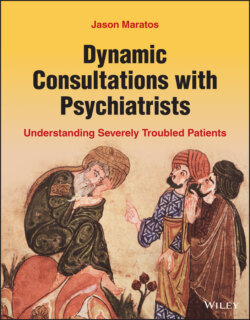Читать книгу Dynamic Consultations with Psychiatrists - Jason Maratos - Страница 8
History of Present Illness
ОглавлениеMs. A met her ex‐husband in the city; he is a distant relative, 10 years her senior, working as restaurant staff. They were married in her early 20s after a courtship of 1 year. Her first two pregnancies were planned, whereas the third pregnancy was unplanned but wanted. There were no immediate postpartum depressive episodes. She found that her ex‐husband became aloof after the birth of their children; he supported the family financially but did not attend to his wife or their children, including the puerperal periods. He spent most of his time playing with birds (keeping birds as pets), gambling, and horse racing after work. There was no physical violence, but there was verbal aggression.
Ms. A's mood deteriorated from the age of 26; she had frequent crying spells. Ms. A found it hard to cope with the care of three children on her own because there was no local relative or friend to support her. She feared any stepmother might maltreat her daughters if she divorced and her husband remarried. Ms. A feared that her own experience of being brought up may have been reenacted. She had decided to leave her husband when her elder daughter reached the age of 18.
Ms. A's low mood was associated with initial and middle insomnia, fatigue, and fleeting suicidal ideas of jumping onto rail tracks but there were no suicidal attempts. Her major hope was from caring and obedient children when they were small. At times, she experienced free‐floating anxiety, dyspepsia, chest tightness, and shortness of breath. She visited a general practitioner. She was prescribed a hypnotic, which was useful only for the initial period.
Early in her 40s, when her elder daughter reached the age of 18, she decided to divorce, and she was awarded custody of her younger daughter'. Ms. A could not afford raising her, and eventually, her younger daughter lived with ex‐husband while the other 2 children lived apart from her and from each other (one married and one living with a partner). Ms. A rented a room on her own and worked as a server. Ms. A was expecting her mood to improve on leaving her husband, but it did not. Ms. A was feeling guilty about leaving her youngest daughter (aged 12). This was not described excessive guilt. She was unable to work after a wrist injury, which she suffered while on duty, because she could not lift loads.
Her general practitioner referred ger and she has been known to psychiatric services since she was 42 years old (in 1998). She was diagnosed with dysthymia and was prescribed Deanxit, trazodone, and promethazine. Her sleep had improved only slightly.
Ms. A lived with elder daughter's family in the last 10 years since her daughter became pregnant. She claimed that she had a good relationship with her daughter. Her mood improved when she started to look after her grandsons, but she never reached complete remission. She was later referred to the family medicine clinic in 2009. She had defaulted follow‐up in 2014 because she felt that the contact was not useful.
In the past 2 years, her mood deteriorated because her daughter was annoyed by what she considered to be an overinvolvement in childcare. For example, Ms. A repeatedly asked her daughter not to punish her children. She asked her daughter to prevent the children from making mistakes rather than letting them have a try. Ms. A also blamed her daughter for failing to correct the children when they did not follow Ms. A's commands.
Ms. A's mood deteriorated again. She developed crying spells, insomnia with poor sleep, and fatigue. She lacked daytime engagement. Her memory and concentration worsened; for example, she would forget to turn off the stove at times. She would ask “Why was it not me?” when watching news on fatal car accidents. Four months before admission, Ms. A expressed her intention to return to live alone in her hometown the following year. Her daughter responded, “you can go anytime you like.” She was distressed by this response and developed fleeting suicidal ideas of dying by burning charcoal. However, she did not purchase charcoal when she saw it at a supermarket.
She was referred from the “positive ageing center” to the family medicine clinic. She had tried escitalopram 5 mg nightly when she waited for psychiatric reactivation. Her sleep remained poor with frequent dreams and sleep‐talking. She also complained of constipation and dry eyes. She went to the emergency department under clinical advice in view of suicidal ideas and was admitted to a psychiatric unit.
